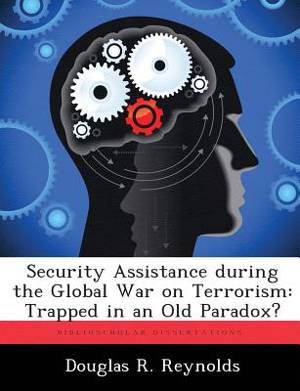
Door een staking bij bpost kan je online bestelling op dit moment iets langer onderweg zijn dan voorzien. Dringend iets nodig? Onze winkels ontvangen jou met open armen!
- Afhalen na 1 uur in een winkel met voorraad
- Gratis thuislevering in België vanaf € 30
- Ruim aanbod met 7 miljoen producten
Door een staking bij bpost kan je online bestelling op dit moment iets langer onderweg zijn dan voorzien. Dringend iets nodig? Onze winkels ontvangen jou met open armen!
- Afhalen na 1 uur in een winkel met voorraad
- Gratis thuislevering in België vanaf € 30
- Ruim aanbod met 7 miljoen producten
Zoeken
Security Assistance during the Global War on Terrorism
Trapped in an Old Paradox?
Douglas R Reynolds
Paperback | Engels
€ 54,45
+ 108 punten
Omschrijving
Background: Grant-based forms of security assistance played a significant role in the efforts to secure the economically devastated nations of post-war Europe. Grant-based assistance would decline once these nations recovered. In the period leading to the Vietnam War, the U.S. used significant grant-based security assistance to help the economically weak nations of Southeast Asia guard against communist invaders and insurgents. The need for security assistance grew during that war and became the primary pillar of President Nixon's plan for withdrawing forces from Vietnam and enabling the U.S. allies to defend themselves unassisted. Paradoxically, the same Congress that had supported security assistance requests throughout the war now opposed it, as did the public. Within two years of the U.S. forces leaving Vietnam, U.S. assistance stopped completely. Thesis: The Global War on Terrorism ushered in another surge of grant-based security assistance efforts. In this new war, the nation has turned to a proven instrument that it has successfully twice before. This paper examines how the current, strategic environment may influence the viability of security assistance as a reliable instrument in the Global War on Terrorism. It does not aim to predict the future, but rather to illuminate major events and trends that will shape the future and to draw parallels from history where they exist. It seeks to answer the question: Should the paradigm of Vietnam alert us to a new danger in the Global War on Terrorism? Research Questions: What created the demand for security assistance in Vietnam, and how did the public perceive security assistance during that war? What will create demand for increased security assistance during the Global War on Terrorism, and how does the public perceive this foreign policy tool today? Are the apparent parallels sufficiently strong to warrant the attention of policy makers and defense planners?
Specificaties
Betrokkenen
- Auteur(s):
- Uitgeverij:
Inhoud
- Aantal bladzijden:
- 60
- Taal:
- Engels
Eigenschappen
- Productcode (EAN):
- 9781288293773
- Verschijningsdatum:
- 13/11/2012
- Uitvoering:
- Paperback
- Formaat:
- Trade paperback (VS)
- Afmetingen:
- 189 mm x 246 mm
- Gewicht:
- 127 g

Alleen bij Standaard Boekhandel
+ 108 punten op je klantenkaart van Standaard Boekhandel
Beoordelingen
We publiceren alleen reviews die voldoen aan de voorwaarden voor reviews. Bekijk onze voorwaarden voor reviews.











